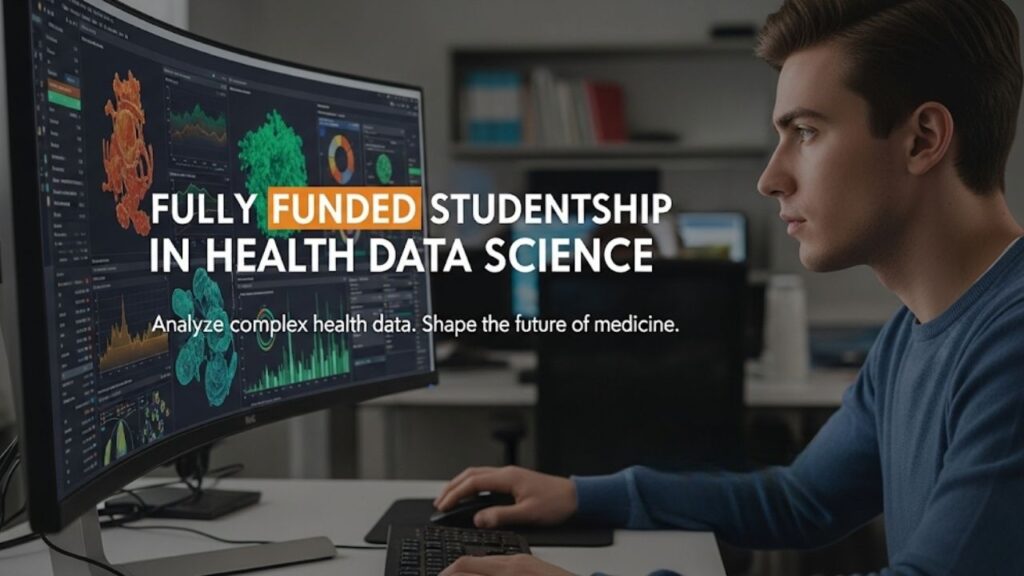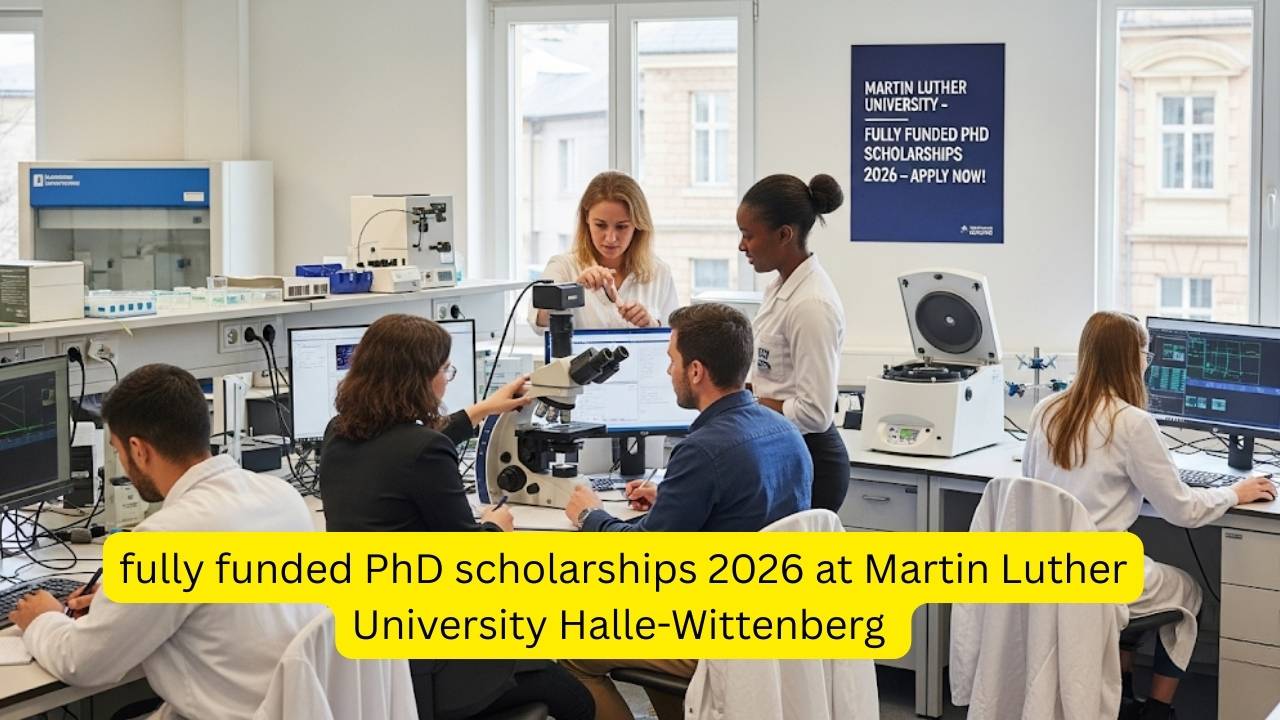Securing a fully funded studentship in health data science can feel like finding the golden ticket to a future where you can tackle some of the world’s most pressing health challenges without the burden of debt. You have the passion for data and a drive to improve public health, but navigating the competitive world of PhD applications can be daunting. This guide is designed to be your roadmap, breaking down the entire process into clear, actionable steps. We’ll demystify the field, explore what makes an application shine, and give you the confidence to pursue this incredible opportunity.

fully funded studentship in health data science
| Key Feature | What It Means For You |
| Generous Stipend | Receive a tax-free living allowance (approx. £23,000 – £26,000 per year) so you can focus on your research, not your finances. Wellcome |
| Full Fee Coverage | Your university tuition fees are completely covered at the home or international rate. University of Edinburgh |
| Research Budget | Access to a dedicated budget for research consumables, conference travel, and training courses. |
| “1+3” Structure | A foundational Master’s year (MRes/MSc) followed by a three-year PhD, providing a solid base before you specialize. |
What Exactly Is Population and Health Data Science?
Before you dive into applications, it’s crucial to understand what this exciting field is all about. Think of a population and health data scientist as a detective for public health. Instead of fingerprints and witnesses, your clues are massive datasets—from electronic health records, genetic databases, national surveys, and even wearable technology.
Your job is to use the tools of statistics, epidemiology, and computer science to find patterns and answer critical questions, such as:
- Why do certain diseases affect one community more than another?
- How effective is a new public health intervention or vaccine?
- Can we predict the next pandemic by analyzing global health data?
It’s an interdisciplinary field that sits at the intersection of medicine, math, and social science. It’s for people who are just as comfortable writing code as they are thinking about health equity.
Why a Fully Funded PhD Is Your Golden Ticket
Pursuing a PhD is a massive commitment, and financial stability is key to your success and well-being. A fully funded studentship is more than just a scholarship; it’s a comprehensive package designed to support you completely.
Here’s what it typically includes:
- No Tuition Fees: Your university fees, which can be substantial (especially for international students), are paid for.
- A Living Stipend: You receive a regular, tax-free salary to cover your living costs like rent, food, and transport. This allows you to immerse yourself in your research without needing a part-time job.
- Research & Training Budget: You get funds to attend international conferences, buy specialist software, or take external training courses. This is invaluable for building your network and skills.
Are You Eligible? Decoding the Requirements

Eligibility for a fully funded studentship in health data science is competitive, but the net is often cast wider than you might think. While specific requirements vary between programs (like those funded by the Wellcome Trust, UKRI, or individual universities), here are the common criteria.
Academic Background
Most successful applicants hold a strong undergraduate or Master’s degree (equivalent to a UK First Class or Upper Second-Class Honours). While degrees in highly quantitative subjects like Mathematics, Statistics, Computer Science, or Physics are ideal, it’s not the only path.
If your background is in biology, medicine, geography, or social sciences, you can still be a very strong candidate, provided you can demonstrate quantitative aptitude. This could be through:
- High grades in specific quantitative modules on your transcript.
- Completing online courses in programming (like Python or R) or statistics.
- Work experience that involved data analysis.
International Students
Great news! Most of the top-tier funded studentships in the UK are now open to all students, regardless of nationality. Funders like the Wellcome Trust and UKRI have committed to covering international fees, making these incredible opportunities truly global. Always check the specific studentship’s “Eligibility” section on the university website to confirm.
How to Get a Funded PhD: Crafting Your Standout Application
This is where you make your case. Your application isn’t just a collection of documents; it’s the story of your potential as a future leader in health data science.
The Personal Statement: Your Story, Your Motivation
Your personal statement is the heart of your application. It should be a compelling narrative that connects your past experiences to your future ambitions. A great statement typically answers three questions:
- Why this field? What drives your passion for population and health data science? Was it a specific course, a news story about health inequality, or a personal experience? Show genuine intellectual curiosity.
- Why this program? Don’t just flatter the university. Name specific professors whose work excites you. Mention unique aspects of the program, like its interdisciplinary nature, specific training modules, or research facilities. This proves you’ve done your homework.
- Why you? This is your chance to shine. Connect your skills (quantitative, analytical, programming) directly to the demands of the program. Use the “show, don’t tell” principle. Instead of saying “I am a good programmer,” say “I developed a Python script to analyze survey data for my undergraduate dissertation.”
In my experience advising students, one common hurdle is failing to connect the dots. The strongest applicants weave a seamless story that shows their journey toward this PhD was not accidental, but a deliberate and passionate pursuit.
Securing Stellar Letters of Recommendation
Strong references are non-negotiable. Choose referees who know you well academically or professionally and can speak to your research potential, work ethic, and quantitative skills.
- Ask Early: Give your referees at least a month’s notice.
- Provide Materials: Send them your CV, personal statement, and details about the program. The more information they have, the more detailed and personal their letter can be.
- Choose Wisely: A glowing letter from a professor who taught you in a key quantitative module is often more valuable than a generic letter from a famous academic who barely knows you.
Nailing the Interview Stage

An invitation to interview means your application has already impressed the admissions committee. Congratulations! Now it’s time to prepare. Interviews are typically held with a panel of 2-4 faculty members and last 30-45 minutes.
Expect questions covering
- Your Motivation: A deeper dive into your personal statement. Be ready to talk passionately about why you want to do this PhD.
- Your Past Experience: They will likely ask about your undergraduate or Master’s research project. Be prepared to explain your methodology, your findings, and what you learned from the process.
- Technical Skills: You might be given a small data problem or a statistical concept to explain. They aren’t looking for perfection but want to see how you think and approach a problem.
- Your Questions: Always have 2-3 thoughtful questions prepared to ask them. This shows your engagement and genuine interest. Ask about lab culture, student-supervisor relationships, or opportunities for collaboration.
Your Future in Health Data Science Starts Now
Pursuing a fully funded studentship in health data science is a challenging but immensely rewarding journey. It’s an opportunity to be at the forefront of medical innovation, working to create healthier and more equitable societies for all.
By understanding the field, carefully preparing your application materials, and confidently presenting your potential, you can stand out from the crowd. Remember that every expert was once a beginner. Take that first step, start researching programs today, and get ready to build your future.
Loughborough University Global Excellence Scholarship 2025
Your Guide to the McCall MacBain Scholarships 2025–2026: A Journey to Leadership
FAQs
Q1:Do I need a Master’s degree to apply for a PhD studentship?
Not always. Many top-tier UK programs, like the Wellcome Trust studentships, are structured as “1+3” or “4-year” programs. This means you enroll in an integrated Master’s (MRes or MSc) in the first year before progressing to the three-year PhD phase. This is ideal for students coming straight from an undergraduate degree.
Q2:Can I apply if my background isn’t in computer science or statistics?
Yes, absolutely. Many programs actively seek a diverse cohort with backgrounds in biology, medicine, chemistry, and even social sciences. The key is to demonstrate strong quantitative potential through your coursework, personal projects, or work experience, and to show a genuine passion for learning the necessary data science skills.
Q3:What is the typical stipend for a fully funded PhD in the UK?
Stipends vary by funder and location, but they are designed to cover living costs comfortably. For the 2024/25 academic year, the UKRI minimum stipend is £19,237, while prestigious funders like the Wellcome Trust often offer more, especially in expensive locations like London (often upwards of £23,000-£26,000). This amount is also tax-free.
Q4:Are these studentships really open to international students with full funding?
Yes. Following changes after Brexit, major UK research funders, including UKRI and the Wellcome Trust, have updated their policies. They now typically fund a quota of international students on their doctoral training programs, covering the higher international tuition fees and providing the same living stipend as home students.










